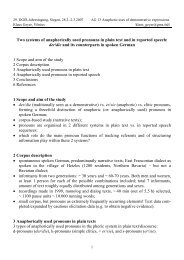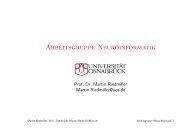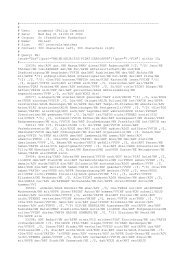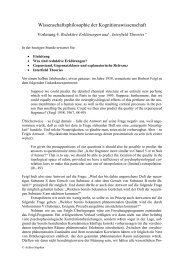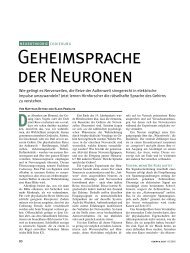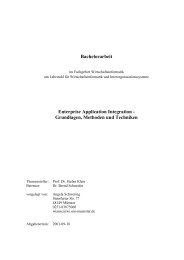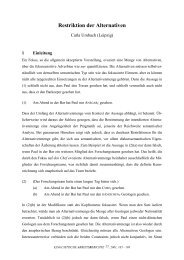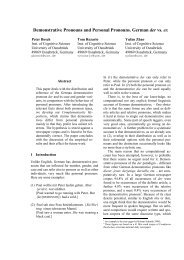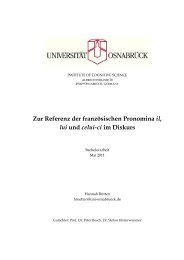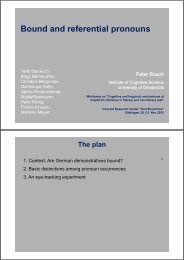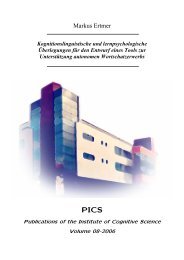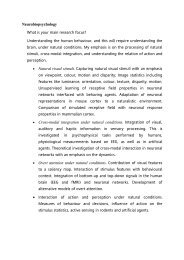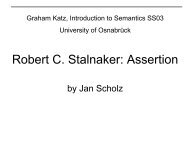Proceedings of the 6th Annual Meeting of the - Heinrich-Heine ...
Proceedings of the 6th Annual Meeting of the - Heinrich-Heine ...
Proceedings of the 6th Annual Meeting of the - Heinrich-Heine ...
You also want an ePaper? Increase the reach of your titles
YUMPU automatically turns print PDFs into web optimized ePapers that Google loves.
(8) [an x: man(x) v sg u(x)](walked_in_<strong>the</strong>_park(x))<br />
As such, subsequent E-type pronouns could be used to make reference to this speaker’s referent.<br />
This would be possible on Neale’s semantic approach to recovering <strong>the</strong> E-type interpretation, if<br />
not on Evans’ syntactic approach.<br />
While overcoming <strong>the</strong> uniqueness problem, this proposal is not viable since it makes <strong>the</strong> truth <strong>of</strong><br />
<strong>the</strong> proposition expressed by <strong>the</strong> utterance <strong>of</strong> <strong>the</strong> first sentence dependent on how things stand<br />
with this speaker’s referent regarding being a man and walking. It is well known that this is<br />
intuitively <strong>the</strong> incorrect analysis, for even if <strong>the</strong> speaker mistakes a woman for a man and thinks<br />
<strong>of</strong> that person as a man walking in <strong>the</strong> park at <strong>the</strong> time in question, <strong>the</strong>n <strong>the</strong> proposition expressed<br />
by <strong>the</strong>ir utterance <strong>of</strong> <strong>the</strong> first sentence would still be true so long as <strong>the</strong>re were men walking in<br />
<strong>the</strong> park at <strong>the</strong> time.<br />
A related problem for <strong>the</strong> linguistic E-type approaches has to do with contradictions using<br />
pronouns. We note that a speaker (B in (9)) can coherently contradict ano<strong>the</strong>r speaker (A) if <strong>the</strong>y<br />
think <strong>the</strong> person <strong>the</strong>y have in mind does not have <strong>the</strong> property used to describe <strong>the</strong>m with an<br />
indefinite. However on any kind <strong>of</strong> linguistic E-type approach, it is part <strong>of</strong> what is expressed by<br />
B that <strong>the</strong> individual being made reference to with <strong>the</strong> pronoun has this property which <strong>the</strong> rest<br />
<strong>of</strong> <strong>the</strong> utterance denies <strong>the</strong>y have. So one should find B’s utterance contradictory, if this kind <strong>of</strong><br />
E-type account were correct.<br />
(9) A: Last night I met a Cabinet minister.<br />
B: She was not a Cabinet minister.<br />
Of course we could suppose that when a speaker utters <strong>the</strong> first sentence in (1)a, some<br />
assumption about her grounds is communicated implicitly while <strong>the</strong> proposition expressed by <strong>the</strong><br />
utterance does not depend for its truth on how things stand with <strong>the</strong> speaker’s referent:<br />
(10) What is said: ›x[man’(x) v walked_in_<strong>the</strong>_park’(x)]<br />
Implicitly communicated: ›x[sg u(x) v Bel(sp, man’(x) v walked_in_<strong>the</strong>_park’(x))]<br />
According to <strong>the</strong> pragmatic approach, such information could be exploited, resulting in an<br />
understanding <strong>of</strong> <strong>the</strong> second sentence in (1)a as in (11). According to <strong>the</strong> linguistic E-type<br />
approach, this is not possible:<br />
(11) ›x[sg u(x) v whistled’(x)]<br />
As we will see presently, (11) is in fact a fair representation our understanding <strong>of</strong> what <strong>the</strong> speaker<br />
expresses with <strong>the</strong> second sentence in (1)a. It is also clear that <strong>the</strong> cases where <strong>the</strong>re is<br />
contradiction would not be problematic for <strong>the</strong> pragmatic approach as <strong>the</strong> description according<br />
to which we understand <strong>the</strong> pronoun would just involve sg u.<br />
While <strong>the</strong> pragmatic account does not suffer from <strong>the</strong> uniqueness problem and <strong>the</strong> related<br />
contradiction problem, it would be obliged to give an account for why <strong>the</strong> appropriate description<br />
can be recovered from implicit information in <strong>the</strong> case <strong>of</strong> (1)a but not in <strong>the</strong> marble discourse.<br />
This problem is quite severe since, if E-type pronouns are just like definite descriptions, <strong>the</strong>n one<br />
would expect <strong>the</strong>se pronouns to be acceptable in all cases where implicit information has to be<br />
20



